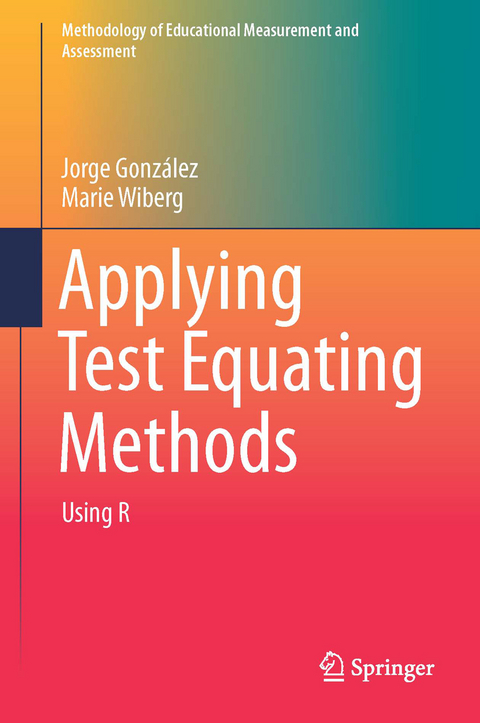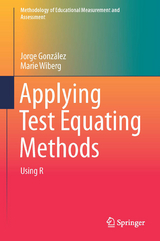Applying Test Equating Methods
Using R
Seiten
2017
|
1st ed. 2017
Springer International Publishing (Verlag)
978-3-319-51822-0 (ISBN)
Springer International Publishing (Verlag)
978-3-319-51822-0 (ISBN)
This book describes how to use test equating methods in practice. The non-commercial software R is used throughout the book to illustrate how to perform different equating methods when scores data are collected under different data collection designs, such as equivalent groups design, single group design, counterbalanced design and non equivalent groups with anchor test design. The R packages equate, kequate and SNSequate, among others, are used to practically illustrate the different methods, while simulated and real data sets illustrate how the methods are conducted with the program R. The book covers traditional equating methods including, mean and linear equating, frequency estimation equating and chain equating, as well as modern equating methods such as kernel equating, local equating and combinations of these. It also offers chapters on observed and true score item response theory equating and discusses recent developments within the equating field. More specifically it covers the issue of including covariates within the equating process, the use of different kernels and ways of selecting bandwidths in kernel equating, and the Bayesian nonparametric estimation of equating functions. It also illustrates how to evaluate equating in practice using simulation and different equating specific measures such as the standard error of equating, percent relative error, different that matters and others.
1. General Equating Theory Background.- 2. Preparing Score Distributions.- 3.Traditional Equating Methods.- 4. Kernel Equating.- 5. Item Response Theory Equating.- 6. Local Equating.- 7. Recent Developments in Equating.
| Erscheinungsdatum | 22.03.2017 |
|---|---|
| Reihe/Serie | Methodology of Educational Measurement and Assessment |
| Zusatzinfo | XXVI, 196 p. 33 illus., 13 illus. in color. |
| Verlagsort | Cham |
| Sprache | englisch |
| Maße | 155 x 235 mm |
| Themenwelt | Geisteswissenschaften ► Psychologie ► Test in der Psychologie |
| Sozialwissenschaften ► Pädagogik ► Bildungstheorie | |
| Sozialwissenschaften ► Pädagogik ► Schulpädagogik / Grundschule | |
| Sozialwissenschaften ► Soziologie ► Empirische Sozialforschung | |
| Schlagworte | Assessment of equating • Assessment, Testing and Evaluation • Bandwidth selection in kernel equating • Bayesian equating • Comparison of equating methods • Concurrent calibration • Education • Education: examinations and assessment • Equating data collection designs • Equating using R • Equating with covariates • Fixed item parameter calibration • IRT equating using R • IRT kernel equating • Item parameter linking • Kernel equating under the NEC design • Kernel equating using R • Local equating using R • Polynomial log-linear models for presmoothing • Presmoothing score distributions • Psychological testing and measurement • Psychometrics • R code for equating • Social research and statistics • Statistics for Social Science, Behavorial Science, • Test equating using R • Traditional equating methods |
| ISBN-10 | 3-319-51822-4 / 3319518224 |
| ISBN-13 | 978-3-319-51822-0 / 9783319518220 |
| Zustand | Neuware |
| Informationen gemäß Produktsicherheitsverordnung (GPSR) | |
| Haben Sie eine Frage zum Produkt? |
Mehr entdecken
aus dem Bereich
aus dem Bereich
Buch | Softcover (2023)
Springer (Verlag)
44,99 €
warum es gut ist, das Leben zu hinterfragen
Buch | Hardcover (2024)
Ullstein Buchverlage
24,99 €




